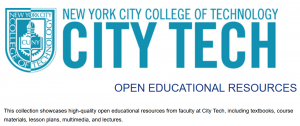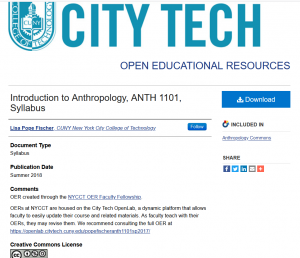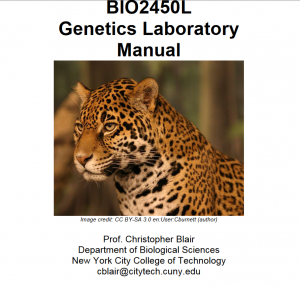“For accessibility to become embedded in our everyday thinking and world, we all need to realize the role we all can play in accessibility. We need to incorporate accessibility into workflows and considerations. Try to step back and think “is X accessible? Is there a way I can make Y accessible?” Ensuring accessibility does not need to be part of a person’s job description or a person’s personal experience and life to become something all people can participate in.“ (Amy Wolfe, OER Accessibility Toolkit)
Accessibility is a core part of OER programming at City Tech. Developing course materials with accessibility in mind can help with course delivery across modalities and remove barriers to engaging with course subjects. Rather than making course materials accessible after accommodation requests have been made, we can make our courses accessible to everyone from the start by building accessibility into our instructional design process. If you aren’t sure where to start with making your courses accessible, below you’ll find openly licensed materials about digital accessibility, including document, image, and video accessibility.
- Accessibility Toolkit for OER by CUNY Office of Library Services’ Accessibility Librarian, Amy Wolfe (Updated 2023). License: CC BY-NC-SA
“This guide was created to assist CUNY Librarians, faculty, staff & OER developers create accessible content and accessible Open Educational Resources (OER). On this guide you will find information on:- Creating Accessible Content: Tips on how to create accessible content including, word docs, pdfs, Images, videos, social media posts and other multimedia
- Platforms: What OER platforms are accessible? What are the pros and cons of using each platform?
- Evaluating your OER site: Determine if your site is accessible and see how to fix issues on your site
- VPATs: Voluntary Product Accessibility Template: Collection of VPATs from various vendors to see relevant information on how a vendor’s product or service claims to conform to the Section 508 Standards.”
- Digital Accessibility as a Business Practice by Greg Gay, Frank Miller, and Christopher West, The Chang School of Continuing Education at Toronto Metropolitan University (2019). License: CC BY-SA
“This resource provides business leaders with the tools and knowledge needed to effectively enable digital accessibility in an organization through cultural change, raising awareness of its importance, and equipping employees with the specific tools and knowledge they need to address digital accessibility as part of their everyday work.”
- Flexible Learning for Open Education (FLOE) Project by The Inclusive Design Research Centre and OCAD University. License: CC BY
“Learning happens best when the experience is personalized to individual needs. Open Educational Resources (OER) that are open to use and adapt, provide an opportunity to meet the diverse needs of learners, including those with disabilities. The FLOE Project supports the OER community in providing a sustainable, integrated approach to accessible learning, addressing the needs of learners who currently face barriers.” The FLOE project materials include a variety of open guides and toolkits as well as other open education efforts such the Coding Educator’s Toolkit, Ecocultural Mapping Project, and more. - Improving the Digital Accessibility of OER by Amy Hofer (2020). License: CC BY
This post provides an overview of accessibility and evaluating inaccessible OER as well as a detailed account of the author’s accessibility workflow. - OER Accessibilty Tookit by BCcampus, Camosun College, and CAPER-BC (2018). License: CC BY
“The goal of the OER Accessibility Toolkit is to provide the needed resources to each content creator, instructor, instructional designer, educational technologist, librarian, administrator, and teaching assistant to create a truly open and accessible educational resource — one that is accessible for all students.” The OER Accessibility Toolkit is available on one site page here. - Professional Web Accessibility Auditing Made Easy by The Chang School of Continuing Education at Toronto Metropolitan University (2019). License: CC BY-SA
“Digital accessibility skills are in high demand, as the world becomes more aware of barriers in digital content that prevent some people from participating in a digital society. These are essential skills for web developers, and essential knowledge for organizations that want to ensure their web content is reaching the broadest audience possible.” - Understanding Document Accessibility by The Chang School of Continuing Education at Toronto Metropolitan University (2020). License: CC BY-SA
“With much of the world gone digital, learning to create documents that are accessible to everyone is becoming a necessary skill. Intended for a general audience, this free resource reviews a wide range of document authoring applications, including the tools they contain for creating accessible documents, and tests them to ensure they do not contain potential barriers. Learn how to create accessible word processed documents, spreadsheets, presentation slides, and PDF documents, among others, so they are accessible to everyone.”
For more information about OER and OER programming at City Tech, email OER Librarian Cailean Cooney at ccooney@citytech.cuny.edu.






